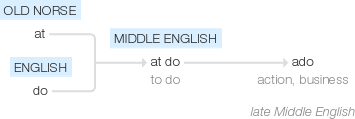Ado
late Middle English (originally in the sense ‘action, business’): from northern Middle English at do ‘to do’, from Old Norse at (used to mark an infinitive) and do1.
wiktionary
From Northern Middle English at do(“to do”), infinitive of do, don(“to do”), see do. Influenced by an Old Norse practice of marking the infinitive by using the preposition at, att (compare Danish at gå(“to go”)). More at at, do.
etymonline
ado (n.)
late 14c., "conflict, fighting; difficulty, trouble," a contraction of at do, literally "to do," a dialectal northern English formation in the Norse-influenced areas of England, as some Scandinavian languages used at with the infinitive of a verb where Modern English uses to. From use of the infinitive in much ado ("much to do") and similar phrases, ado came to be regarded as a noun. Compare the sense evolution in to-do and affair (from French infinitive phrase à faire "to do"). The weakened meaning "fuss" is from early 15c. Also used in Middle English for "dealings, traffic," and "sexual intercourse" (both c. 1400).
